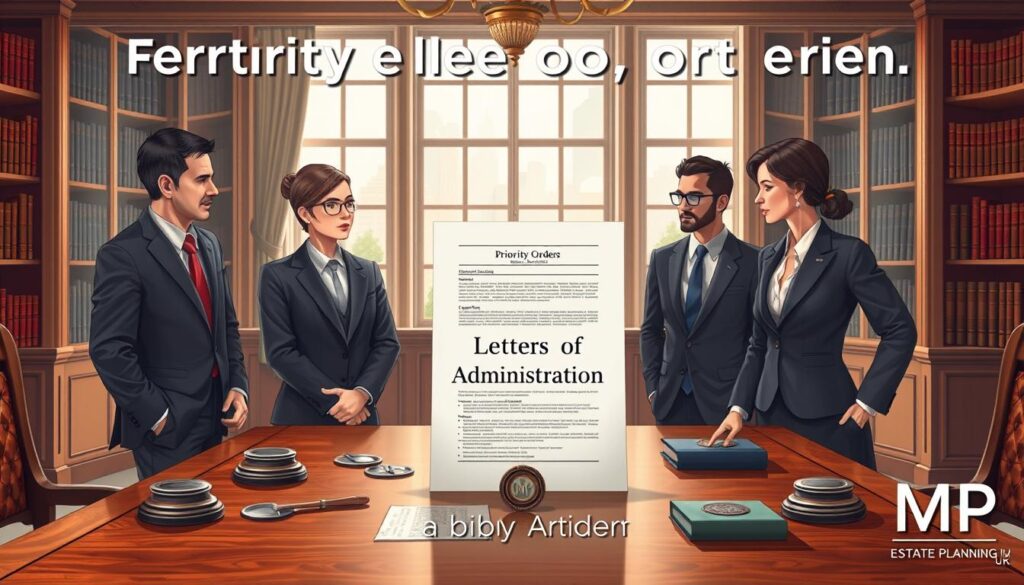When a loved one passes away without a will, the process of managing their estate can become complex. In the UK, over 40% of deaths are not followed by a registered will, leaving families to navigate the intestacy rules and understand who gets letters of administration first.
We are here to guide you through this challenging time. A Grant of Letters of Administration is an official document released by the Probate Registry, authorising an Administrator to manage the deceased individual’s estate. Understanding the probate hierarchy is crucial in determining who should take on this responsibility.
In this article, we will explain the priority order for granting letters of administration in the UK, providing clarity on this complex process.
Key Takeaways
- The priority order for granting letters of administration is determined by the UK’s intestacy rules.
- The probate hierarchy plays a crucial role in deciding who should administer the estate.
- Understanding the intestacy rules can help families navigate the complex process of estate management.
- The Grant of Letters of Administration is an official document authorising an Administrator to manage the estate.
- Seeking professional guidance can help ensure that the estate is managed correctly and efficiently.
What Are Letters of Administration?
In the UK, letters of administration are essential for managing the estate of an individual who dies intestate. This document grants the Administrator legal power to oversee the distribution of assets, settling debts, and other relevant responsibilities involved in handling the estate of the deceased person.
Letters of administration are a critical component of estate administration, ensuring that the estate is managed according to the law. The Administrator’s role is to act in the best interests of the estate and its beneficiaries, making decisions on asset distribution, debt settlement, and other financial matters.
Definition and Purpose
Letters of administration are a legal document issued by the court, authorizing an individual to administer the estate of a deceased person. The purpose of these letters is to provide the Administrator with the legal authority to manage the estate’s assets, pay off debts, and distribute the remaining assets according to the laws of intestacy.
The Administrator’s responsibilities include:
- Identifying and gathering the estate’s assets
- Paying off debts and taxes
- Distributing the remaining assets among the beneficiaries
Importance in Estate Management
The importance of letters of administration in estate management cannot be overstated. They provide a clear and legal framework for the administration of the estate, ensuring that the Administrator acts in accordance with the law and in the best interests of the beneficiaries.
As noted by a legal expert, “Letters of administration provide the necessary authority for the Administrator to manage the estate effectively, ensuring that the deceased person’s wishes are respected and the beneficiaries receive their rightful inheritance.”
“The role of the Administrator is crucial in ensuring that the estate is administered efficiently and effectively, minimizing delays and disputes among beneficiaries.”
A comparison of the roles of Executors and Administrators is provided in the table below:
| Role | Executor | Administrator |
|---|---|---|
| Appointment | Appointed by the deceased in their will | Appointed by the court through letters of administration |
| Responsibilities | Carries out the instructions in the will | Manages the estate according to the laws of intestacy |
Legal Framework for Letters of Administration in the UK
Understanding the legal framework for letters of administration in the UK is crucial for navigating the complexities of estate management. The process involves several key pieces of legislation and the Probate Registry, which work together to ensure that the estate of a deceased person is handled correctly.
Relevant Legislation
The legal framework for letters of administration in the UK is primarily governed by two significant pieces of legislation: The Non-Contentious Probate Rules 1987 and The Senior Courts Act 1981. These laws outline the procedures and rules for applying for letters of administration, ensuring that the process is conducted fairly and in accordance with the law.
The Non-Contentious Probate Rules 1987 provide detailed guidance on the procedures for obtaining a grant of letters of administration, including the order of priority for applicants. Meanwhile, The Senior Courts Act 1981 establishes the jurisdiction of the High Court in probate matters, including the granting of letters of administration.

Probate Registry’s Role
The Probate Registry plays a vital role in the administration of estates in the UK. It is responsible for processing applications for letters of administration, ensuring that all necessary documentation is in order, and that the applicant has the legal right to administer the estate.
When an application is made, the Probate Registry examines the submitted documents to verify the deceased’s identity, the applicant’s relationship to the deceased, and the estate’s value. This scrutiny helps to prevent fraudulent activities and ensures that the estate is distributed according to the law.
By understanding the legal framework and the role of the Probate Registry, individuals can better navigate the process of obtaining letters of administration, ensuring that the estate is managed efficiently and in accordance with UK laws.
Priority Order for Granting Letters of Administration
In the absence of a will, the court’s decision on who receives letters of administration is guided by a specific order of priority. This order is crucial in ensuring that the estate is managed by the most appropriate person or persons.
Intestacy and Its Implications
When a person dies intestate, the UK’s intestacy rules dictate how their estate is distributed. Intestacy can lead to complexity and potential disputes among family members, making it essential to understand the implications.
The rules of intestacy are designed to provide a fair distribution of the estate among the deceased’s relatives. However, this may not always align with the deceased’s wishes, highlighting the importance of having a valid will.
Order of Priority Explained
The order of priority for granting letters of administration in the UK is as follows:
- The surviving spouse or civil partner, who is typically first in line to administer the estate.
- Children of the deceased, who may apply if there is no surviving spouse or civil partner.
- Other relatives, such as siblings, nieces, and nephews, who may be considered if the above categories are not applicable.
It’s worth noting that the court’s decision is based on the UK intestacy rules, which provide a clear hierarchy for determining who should administer the estate.

Understanding the succession rules UK is vital for navigating the process of administering an estate when there’s no will. By knowing the order of priority, individuals can better prepare for the responsibilities and challenges that come with managing an intestate estate.
Priority Order: Spouses and Civil Partners
The law in the UK generally favours the surviving spouse or civil partner when it comes to granting letters of administration. This means that when a person dies without a will, their spouse or civil partner is usually the first to be considered for this role.
Automatically First in Line
In the UK, the surviving spouse or civil partner is automatically given priority for letters of administration due to the succession rules UK. This rule is in place to provide a straightforward and predictable process for managing the deceased’s estate. For instance, if a husband dies without a will, his wife would typically be granted letters of administration to oversee the distribution of assets UK.
To illustrate this, consider the following example: John and Emily are married. John dies without a will, leaving behind a significant estate. According to the UK intestacy rules, Emily, as the surviving spouse, would be first in line to receive letters of administration, allowing her to manage John’s estate.
Rights of Surviving Spouses
Surviving spouses or civil partners have significant rights when it comes to the estate of the deceased. Not only are they typically granted letters of administration, but they also have a significant say in the distribution of assets UK. The law aims to protect the interests of the surviving spouse or civil partner, ensuring they are not left without the necessary resources.
The following table outlines the general priority order for letters of administration, highlighting the position of spouses and civil partners:
| Priority Order | Beneficiary | Rights |
|---|---|---|
| 1st | Surviving Spouse or Civil Partner | Automatically granted letters of administration; significant rights in estate distribution |
| 2nd | Children | Entitled to a share of the estate; may be granted letters of administration if no spouse or civil partner |
| 3rd | Other Relatives | Entitled to a share of the estate if no spouse, civil partner, or children |
For more detailed information on the process of obtaining letters of administration, you can visit OMM Law’s website, which provides comprehensive guidance on the subject.
Children and Their Priority for Letters of Administration
In the UK, the administration of a deceased person’s estate is governed by specific rules, with children’s rights being a key consideration. When a person dies without a will, the laws of intestacy dictate who is entitled to administer their estate.
Biological and Adopted Children
Biological and adopted children are given significant priority when it comes to letters of administration. According to UK intestacy rules, they are considered alongside the surviving spouse or civil partner. The probate hierarchy places them in a strong position to administer the estate.
It’s essential to understand that adopted children have the same rights as biological children in this context. The law treats them equally, ensuring that they are not disadvantaged due to their adoption.
Key Points for Biological and Adopted Children:
- They are considered alongside the surviving spouse or civil partner.
- Adopted children have the same rights as biological children.
- Their priority is determined by the UK intestacy rules.
Rights of Stepchildren
Stepchildren, on the other hand, do not have the same automatic rights as biological or adopted children when it comes to letters of administration. However, they may still have a claim on the estate under certain circumstances.
“The law does not automatically grant stepchildren the right to administer an estate, but they may be considered in specific situations, such as when they have been financially dependent on the deceased.” –
To illustrate the priority order, let’s consider the following table:
| Category | Priority Level | Notes |
|---|---|---|
| Biological/Adopted Children | High | Alongside surviving spouse/civil partner |
| Stepchildren | Variable | Dependent on specific circumstances |

Understanding the rights of children in the administration of an estate is crucial for ensuring that the deceased’s wishes are respected and that the estate is distributed fairly. By knowing where biological, adopted, and stepchildren stand in the probate hierarchy, families can better navigate the complex process of estate administration.
Siblings and Other Close Relatives
Understanding the succession rules UK is crucial for siblings and other close relatives who may be next in line for letters of administration. When there are no immediate family members, such as spouses, civil partners, or children, the responsibility of managing the estate falls to other relatives.
We will explore the order of priority among siblings and other close relatives, including cousins and extended family members, to clarify their positions in the estate administration procedure.
Order of Priority Among Siblings
When it comes to siblings, the law treats them equally in the distribution of assets UK. If there are no surviving spouses, civil partners, or children, siblings are next in line to receive letters of administration. Here are key points to consider:
- Biological siblings are treated equally under the law.
- Adopted siblings have the same rights as biological siblings.
- If a sibling has passed away, their children (nieces and nephews) may represent their share.
Cousins and Extended Family
If there are no surviving siblings, the estate is passed down to more distant relatives. The order typically follows this sequence:
- Nieces and nephews
- Grandparents
- Aunts and uncles
- Cousins
- More distant relatives, such as great-aunts, great-uncles, and their descendants
It’s essential to understand that the estate administration procedure can become complex when it involves extended family members. The rules of intestacy dictate the order in which relatives are entitled to the estate.

We recommend seeking professional guidance to navigate these complexities and ensure that the estate is distributed according to the law.
The Role of Executors in Granting Letters of Administration
In the UK, the process of estate administration involves understanding the distinction between executors and administrators. When a person passes away, their estate needs to be managed and distributed according to their wishes, if they have left a will, or according to the law if they haven’t.

Difference Between Executors and Administrators
Executors are individuals named in a will to administer the estate of the deceased. They are responsible for carrying out the instructions in the will, managing the estate’s assets, paying debts, and distributing the remaining assets to beneficiaries. On the other hand, administrators are appointed when there is no will or no executor named in the will. They are granted letters of administration by the probate registry to manage the estate according to the law.
The key differences between executors and administrators lie in their appointment and responsibilities:
- Executors are appointed by the deceased in their will, while administrators are appointed by the probate registry.
- Executors act according to the instructions in the will, whereas administrators follow the rules of intestacy.
For more detailed information on the duties of executors, you can visit https://mpestateplanning.uk/executor-duties-explained-a-uk-guide-to-managing-a-will/, which provides a comprehensive guide on managing a will in the UK.
Executors and Family Dynamics
Family dynamics can significantly impact the appointment and functioning of executors. In some cases, family members may dispute the appointment of an executor, especially if they feel that the chosen executor is not acting in the best interests of the estate or its beneficiaries. It’s essential for executors to maintain transparency and communicate effectively with all parties involved to avoid conflicts.
“The role of an executor is not just to administer the estate but to do so in a way that respects the wishes of the deceased and the rights of the beneficiaries.”
In complex family situations, the probate process can become challenging. Understanding the UK probate laws and the probate hierarchy is crucial for navigating these complexities. Executors and administrators must work within this legal framework to ensure that the estate is administered correctly.
Unmarried Couples and Their Position
Understanding the position of unmarried couples under UK succession rules is crucial for effective estate planning. Unmarried couples do not have the same automatic rights as married couples or civil partners under the rules of intestacy.
Legal Rights of Cohabiting Partners
Cohabiting partners, or unmarried couples, have limited legal rights when it comes to the distribution of assets upon the death of their partner. Unlike married couples, they are not entitled to a share of the estate under the UK intestacy rules unless they are named in the will or have a legal claim through other means.
To protect their interests, unmarried couples should consider:
- Making a will to specify how they want their estate to be distributed.
- Entering into a cohabitation agreement that outlines their rights and responsibilities.
- Ensuring they have appropriate life insurance policies in place.
Challenges Faced by Unmarried Couples
Unmarried couples often face significant challenges when dealing with the estate of a deceased partner, particularly if they are not prepared. The succession rules UK can leave them without automatic entitlement to the deceased’s assets, potentially leading to disputes and financial hardship.
The following table highlights key differences in the treatment of married and unmarried couples under UK law:
| Aspect | Married Couples/Civil Partners | Unmarried Couples |
|---|---|---|
| Automatic Inheritance Rights | Yes, under UK intestacy rules | No automatic rights |
| Entitlement to Estate | Entitled to a share of the estate | Not entitled unless named in the will |
| Legal Protection | Protected under succession rules UK | Limited legal protection |
| Distribution of Assets | Governed by intestacy laws | Depends on the will or other agreements |

It’s essential for unmarried couples to understand their position and take proactive steps to protect their partner’s estate. By doing so, they can ensure that their rights are respected and their loved ones are provided for.
The Impact of Wills on the Priority Order
In the UK, the presence or absence of a will greatly influences the priority order for granting letters of administration. When a person dies with a valid will, it can significantly alter the estate administration procedure.
When a Will is Present
If the deceased left a valid will, the executors named in the will are typically granted probate, allowing them to manage the estate according to the deceased’s wishes. This can change the priority order, as the executors are given precedence over other potential administrators.
Key Considerations:
- The will must be valid and recognized by UK law.
- Executors named in the will are usually given priority.
- The estate is administered according to the deceased’s instructions in the will.
| Aspect | With a Will | Without a Will |
|---|---|---|
| Administration Priority | Executors named in the will | Next of kin according to intestacy rules |
| Estate Distribution | According to the deceased’s wishes as stated in the will | Following UK intestacy laws |
Intestacy Without a Will
If the deceased died without a will, the estate is administered according to UK intestacy laws. The priority order for letters of administration is then determined by the family relationships of the deceased.
Understanding intestacy rules is crucial for those dealing with the estate of someone who died without a will. The rules dictate the order in which relatives can apply for letters of administration.
Priority Order Without a Will:
- Spouse or civil partner
- Children
- Other relatives as per UK intestacy laws
By understanding how a will impacts the priority order, individuals can better navigate the complexities of estate administration in the UK.
Special Considerations for Minors and Vulnerable Persons
In the UK, the law provides specific safeguards for minors and vulnerable persons when it comes to the administration of estates. This is crucial to ensure that their interests are protected throughout the process of granting Letters of Administration.
Appointing Guardians in the Process
When minors are involved, the court may need to appoint a guardian to manage their inheritance until they reach the age of majority. This guardian is responsible for making decisions in the best interest of the minor, ensuring that their financial well-being is maintained.
The appointment of a guardian is a significant decision, as it involves entrusting someone with the responsibility of managing the minor’s assets. The court’s primary concern is to select a guardian who is capable and willing to act in the minor’s best interests.
The Role of the Court in Protecting Vulnerable Individuals
The court plays a vital role in protecting the interests of both minors and vulnerable persons during the administration of estates. It oversees the appointment of guardians and administrators, ensuring that they act in accordance with the law and in the best interests of the vulnerable individuals.
In cases where vulnerable persons are involved, the court may need to make decisions on their behalf, taking into account their specific needs and circumstances. This may involve appointing a deputy or making decisions regarding the management of their financial affairs.
We understand that navigating the complexities of Letters of Administration can be challenging, especially when minors or vulnerable persons are involved. Our team is here to provide guidance and support throughout the process, ensuring that the rights and interests of all parties are protected.
Disputes Over Letters of Administration
Letters of administration disputes can complicate the estate administration process, causing delays and additional stress for those involved. When multiple parties are interested in the estate, disagreements can arise, making it challenging to reach a consensus on how to proceed.
Reasons Behind the Disputes
Disputes over letters of administration often stem from various factors, including:
- Differing interpretations of the deceased’s wishes
- Disagreements among family members regarding the distribution of assets
- Concerns about the validity of the will or the competence of the appointed executor
- Conflicts of interest among beneficiaries
Understanding these potential flashpoints can help individuals prepare for the challenges they may face during the estate administration process.
Resolving Conflicts Through Mediation
Mediation offers a viable solution for resolving disputes related to letters of administration. By engaging a neutral third-party mediator, parties can discuss their concerns and work towards a mutually acceptable agreement.
Mediation benefits include:
- Reduced conflict and stress
- Cost savings compared to litigation
- Faster resolution
- Preservation of family relationships
By opting for mediation, individuals can navigate disputes more effectively, ensuring the estate administration process is as smooth as possible under UK probate laws.
How to Apply for Letters of Administration
Applying for letters of administration is a crucial step in managing the estate of a deceased individual in the UK. This process involves several key steps and requires a thorough understanding of the necessary documentation and procedures.
To begin, it’s essential to understand the necessary documentation required for the application. This typically includes:
- The death certificate
- Details of the deceased’s assets and liabilities
- Information about the beneficiaries
- Any other relevant documents related to the estate
Necessary Documentation
Gathering the necessary documentation is a critical step in the application process. The required documents may vary depending on the complexity of the estate and the specific circumstances of the deceased. Ensuring that all documents are accurate and complete will help streamline the application process.
It’s also important to note that the application process involves completing the relevant forms, which can be obtained from the UK’s Probate Registry or downloaded from their official website.
Applying via the Probate Registry
The application for letters of administration is submitted to the Probate Registry, which is responsible for overseeing the probate hierarchy and ensuring that the estate is administered according to UK probate laws. The Probate Registry will review the application, verify the information provided, and issue the letters of administration if everything is in order.
To apply, one must complete the relevant forms and submit them to the Probate Registry along with the required documentation and fee. It’s advisable to seek professional guidance to ensure that the application is processed smoothly and efficiently.
By understanding the letters of administration process and following the correct procedures, individuals can navigate this complex process with confidence. It’s crucial to be thorough and accurate when completing the application to avoid any delays or complications.
Conclusion: Navigating the Process
Understanding the priority order for letters of administration is crucial for ensuring that the estate administration process is carried out correctly and efficiently in the UK. The estate administration procedure can be complex, but knowing who is entitled to apply for letters of administration helps to simplify the process.
Key Takeaways on Priority Order
The priority order for granting letters of administration is determined by the UK intestacy rules, which dictate that spouses and civil partners are automatically first in line. Children, siblings, and other close relatives follow in a specific order, as outlined by the relevant legislation.
Practical Implications for Estate Administration
By understanding the letters of administration priority order UK, individuals can better navigate the estate administration procedure. This knowledge helps to prevent disputes and ensures that the estate is distributed according to the law. For those dealing with the estate of a loved one, clear guidance on the UK intestacy rules is invaluable.


